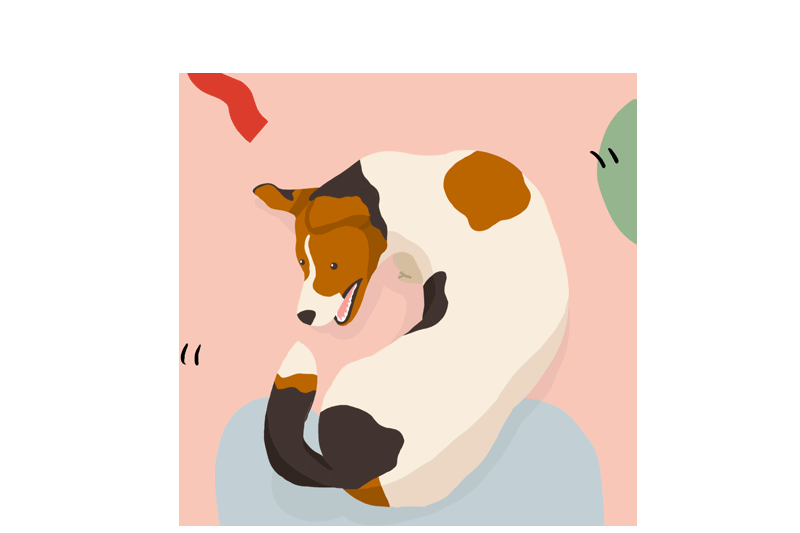Why Do Dogs Chase Their Tails?

Yeji Kim
Our dogs engage in all sorts of weird behaviors that make us laugh or scratch our heads and chasing their own tail is just one of the many odd-ball things a dog might do. It's usually harmless, but sometimes this behavior means something concerning is afoot. Here's how to identify some possible reasons why dogs chase their tails and when you may want to consider a vet visit.
Why Do Dogs Chase Their Tails?
The majority of the time, when your pooch suddenly decides her own tail is super interesting, she is just being a silly dog. However, if she becomes obsessed with chasing her own tail or the behavior occurs alongside any of the other concerning symptoms below, it's time to seek the help of your veterinarian or veterinary behaviorist to rule out a more serious issue.
1. Your Dog Is Just Being Playful
Sometimes your dog just feels really good and is super excited about the day. This may make her quickly spin or chase her tail for a few moments. You might find that when she is especially stoked about something (a new toy or time for a walk) she will offer this behavior every time that awesome thing occurs. This is all totally normal and just a dog being an adorable dog.
RELATED: Why Do Dogs Wag Their Tails?
2. Your Dog Feels Anxious
Feeling nervous or anxious is just as unsettling to your canine companion as it is to you. When your dog is feeling that uncomfortable anticipation, like say before going to a vet or right before you leave to go to work, she may all of a sudden engage in repetitive behaviors such as chasing her tail. If this is accompanied by other concerning behaviors like excessive whining, barking, chewing, destroying items in the home, or having potty accidents, she may be dealing with separation anxiety or some other kind of anxiety. Consult with a veterinary behaviorist or certified canine behavior consultant to determine the next best steps to help your pupper.
In situations where your dog feels conflicted or unsure of what to do, she might display displacement behaviors, which are normal canine behaviors that are displayed out of a normal context. Tail chasing or spinning can be a displacement behavior, especially in locations where your dog encounters stressful triggers. In this scenario, it's important to be a source of comfort and support and do what you can to alleviate the stressors in the environment.
3. Your Dog Could Have Canine Compulsive Disorder
Many dogs, especially herding dogs, engage in some repetitive behaviors. This usually looks like a dog that really wants you to throw that Frisbee again or wants to perform that favorite trick again and again to get another treat. Some dogs might spin in circles when they feel overly excited and others might start chasing their tails.
These can all be short-term and normal repetitive behaviors tied to a specific context. However, repetitive behaviors turn into a problem when they interfere with normal day-to-day functioning. If your dog seems obsessed or fixated on something and you cannot distract her, or she chases her tail at odd times over and over again, your dog may be dealing with a compulsive disorder. Canine compulsive disorder can manifest in a lot of ways but commonly appears as tail chasing, obsessive licking or chewing of an area on the body, obsessive barking, jumping up and down, or pacing.
There are lots of different causes for canine compulsive disorder including genetics, stress and severe anxiety, medical issues, or frustration. Frustration is the reason we don't recommend dog parents use laser pointers as a way to play with their pets. Because your pet can never catch the light, it interferes with their normal play sequence and leads to a very frustrated animal that may become obsessed. Your dog needs enrichment that engages both her mind and body, so instead do some trick training sessions using positive reinforcement, go for a hike, try out nose work, play a game of fetch, or offer a snuffle mat.
4. Your Dog Could Have a Medical Issue
When our dogs are not feeling well they may engage in behaviors they wouldn't normally. When dogs chase their tails repetitively, it can be an indicator of a health issue including, but not limited to, anal gland issues, nervous system issues, tail damage (broken bone or injury), allergies or a skin disorder, or a seizure disorder. These can all be serious issues that come on suddenly and progress quickly so it's best make an appointment with your veterinarian right away.

